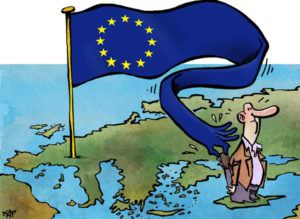Greece to Move 2,000 Out of Overcrowded Lesbos Migrant Camp
Those being moved out of the camp, which houses 9,000 people in a facility built for 3,100, will be sent to the mainland so their asylum claims can be examined.ATHENS, Greece — Some 2,000 asylum-seekers will be moved out of a severely overcrowded migrant camp on the Greek island of Lesbos this month, a Greek official said Tuesday as charities slammed conditions at the camp, which has raw sewage running out of its main entrance.
Government spokesman Dimitris Tzanakopoulos said those being moved out of the Moria camp, which houses 9,000 people in a facility built for 3,100, will be sent to the mainland so their asylum claims can be examined.
“The situation in Moria is indeed difficult, it is indeed at the limit,” Tzanakopoulos said.
Regional governor Christina Kalogirou had threatened to shut down the facility unless the Greek government improves conditions at Moria.
Doctors Without Borders has called for the emergency evacuation of vulnerable people at the camp to the mainland and other European Union countries, citing an increase in suicide attempts and self-harm among children in Moria and cases of sexual attack.
“This is the third year that MSF has been calling on the Greek authorities and the EU to take responsibility for their collective failures and to put in place sustainable solutions to avoid this catastrophic situation,” said Louise Roland-Gosselin, MSF’s Head of Mission in Greece. “It is time to immediately evacuate the most vulnerable to safe accommodation in other European countries and to stop this never-ending cycle of emergency decongestions and the horrendous conditions we continue to witness in Moria.”
Thousands of people fleeing violence and poverty at home are still arriving at Greek islands from the nearby Turkish coast. Between Friday and Sunday, more than 600 reached Lesbos alone.
Under a 2016 deal between the EU and Turkey designed to halt the flow of refugees and migrants into Europe, those arriving on Greek islands are held in detention camps there and face deportation back to Turkey unless their asylum applications are approved.
But the massive backlog of applications has led to severe overcrowding on the Greek island camps, even as authorities move hundreds of vulnerable people to the mainland.
“What the Greek government is trying to do is to reduce the time required for a decision to be issued granting — or rejecting — asylum … but there is always reality,” Tzanakopoulos said. “We try to strike a balance between respecting human rights … and trying to decongest as far as possible the islands.”
However, he stressed that the issue of immigration could only be solved if all European countries agreed to take in some of the asylum-seekers. Some EU nations — especially the Visegrad Group of Hungary, Poland, the Czech Republic and Slovakia — have mostly refused to take in refugees.
“The only way for an overall solution to the immigration crisis is an equal and proportional sharing of refugees throughout Europe. And for as long as the Visegrad countries insist on their anti-European, anti-humanitarian and — in my opinion — illegal — approach to European decisions, the problem will persist,” Tzanakopoulos said.
Further to the east, Cyprus has been seeing an increase in the number of people arriving there to claim asylum. The EU’s migration commissioner, Dimitris Avramopoulos, said Tuesday that the EU’s new, upgraded border police could be dispatched to Cyprus.
An EU team will arrive in Cyprus shortly to determine what kind of help the country needs to cope with the increased migrant inflows, he said.
“Cyprus is not alone. Europe is at its side,” Avramopoulos said after meeting with Cyprus’ interior, foreign and justice ministers. “Cyprus is on Europe’s borders and on the front line of the migrant and refugee crisis.”
Avramopoulos said the EU’s new border police will be “more advanced and upgraded” from the current body, Frontex, and will have an estimated 10,000 staff within a few years.
Interior Minister Constantinos Petrides said it’s “impossible” for Cyprus, a divided island nation with just over 1 million people, to absorb large numbers of migrants.
____
Hadjicostis reported from Nicosia, Cyprus. Nicholas Paphitis in Athens contributed to this report.
Your support matters…Independent journalism is under threat and overshadowed by heavily funded mainstream media.
You can help level the playing field. Become a member.
Your tax-deductible contribution keeps us digging beneath the headlines to give you thought-provoking, investigative reporting and analysis that unearths what's really happening- without compromise.
Give today to support our courageous, independent journalists.





You need to be a supporter to comment.
There are currently no responses to this article.
Be the first to respond.